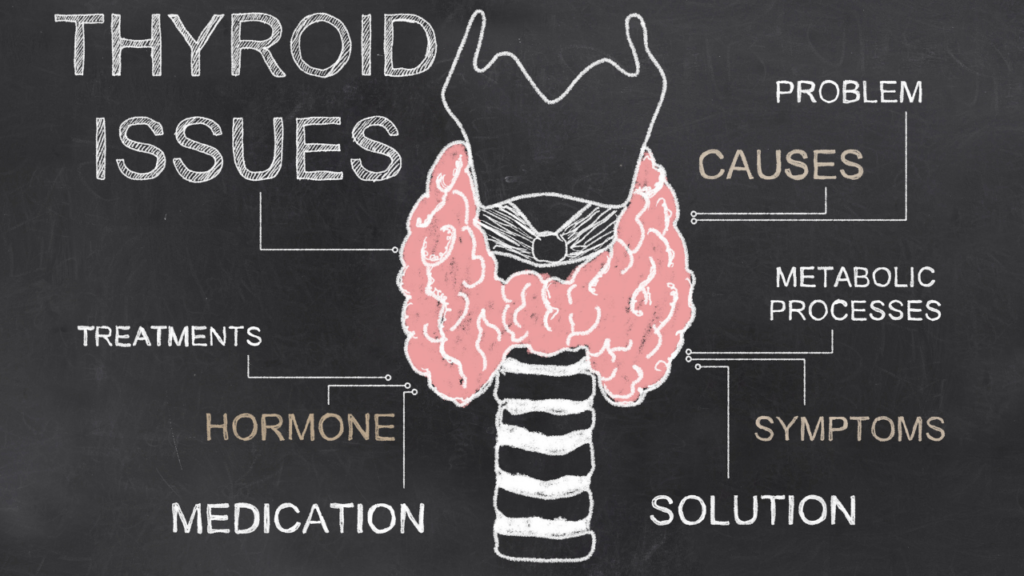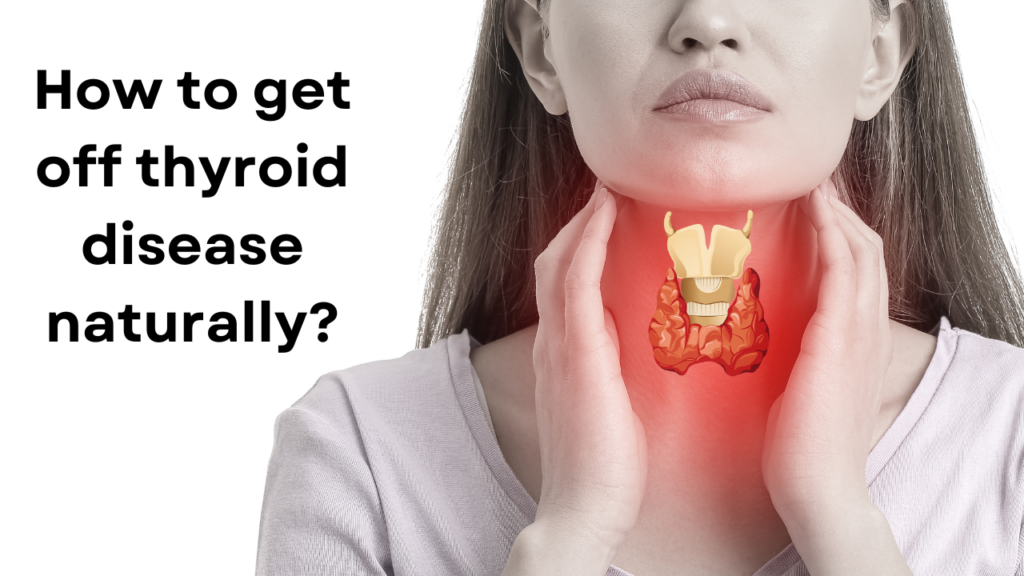Thyroid disease is a common health condition marked by the malfunction of the thyroid gland, usually where it over or under-functions. The thyroid gland is an essential organ that controls metabolism and various bodily functions. While conventional medical treatments are vital in managing to treat thyroid disease naturally, investigating natural treatment alternatives can offer supplementary assistance and enhance overall health.

At Make Care Health, our naturopathic approach to treating thyroid disease includes supplementing or switching medications, from synthetic levothyroxine to desiccated thyroid, providing both T4 and T3, supplementing for deficient nutrients in the thyroid gland that are required to make thyroxine, and supporting the immune system in the cases of autoimmune thyroid disease. Support includes optimizing nutrition, alleviating stress, and bolstering the body’s innate healing mechanisms.
What is a thyroid?
Your thyroid is a small gland in the front of your neck that looks like a butterfly. The thyroid gland creates hormones that regulate how your body utilizes energy or your metabolism. These hormones affect almost every organ in your body and play a role in important functions like breathing, heart rate, weight, digestion, and mood.
This thyroid gland is part of your body’s endocrine system, which is responsible for regulating different functions in your body. Thyroid diseases can cause your thyroid to make too much or too little of these hormones. There are various types of thyroid diseases, which include:
- Graves disease causing a Goiter: This is when your thyroid gland becomes enlarged.
- Hyperthyroidism: This happens when your thyroid gland produces more thyroxine than your body needs.
- Hypothyroidism: This happens when your thyroid gland doesn’t produce enough thyroine.
- Thyroid cancer: This is a form of cancer that specifically impacts the thyroid gland.
- Thyroid nodules are strange lumps or growths that form inside the thyroid gland.
- Thyroiditis: This is when the thyroid gland becomes swollen from inflammation, typically associated with an autoimmune thyroid disease called Hashimoto’s thyroiditis.
What is the function of the thyroid gland?
The thyroid’s main job is to control how your body uses energy, which is called your metabolism. The thyroid gland produces and releases hormones such as thyroxine (T4), triiodothyronine (T3), reverse triiodothyronine (RT3), and calcitonin to perform its functions. These hormones have an effect on many things your body does, including how fast your metabolism works.
The normal size of the thyroid gland
The size of a thyroid gland can vary a little, but typically it is about 4 to 5 centimeters long, 1 to 2 centimeters wide, and 1 to 2 centimeters thick. In adults, the weight of the thyroid gland is usually between 15 and 25 grams.
Thyroid Symptoms

These issues can lead to a wide range of symptoms that can affect different parts of the body and overall well-being. When the thyroid gland is not functioning properly, it can disrupt the balance of thyroid hormones in the body, resulting in various symptoms and health problems. These symptoms can vary in severity and may include both physical and emotional changes.
- Anxiety, irritability, and nervousness
- Trouble sleeping
- Weight loss
- Enlarged thyroid gland or goiter
- Muscle weakness
- Tremors
- Irregular menstrual periods
- Sensitivity to cold
- Constipation
- Dry skin
- Weight gain
- Puffy face
- Hoarse voice
- Coarse hair and skin
- Muscle aches, tenderness, and stiffness
- Lethargy (feeling tired)
- Slower mental processes
- Depression
- Reduced heart rate
- Tingling or numbness in the hands
It’s essential to remember that symptoms of thyroid issues can differ from person to person, and not everyone will experience all of them. If you suspect you might have a thyroid problem, it’s recommended to seek medical advice from a healthcare professional for a thorough evaluation and accurate diagnosis. They will be able to provide the appropriate guidance and treatment based on your specific situation.
What are the early warning signs of thyroid problems?
Thyroid problems can show early warning signs that differ based on whether the thyroid is overactive or underactive. Recognizing these signs is crucial, and if you experience them, it’s important to see a healthcare provider. Here are some early signs of thyroid disease to watch out for:
- Feeling excessively tired or lacking energy, fatigue, even after getting enough rest.
- Gaining or losing weight without making changes to your diet or exercise routine.
- Noticing a slower or faster heartbeat than usual.
- Feeling more sensitive to temperature changes, such as feeling cold when others are comfortable or feeling excessively warm.
How to get off thyroid medication naturally?
If you suspect any thyroid problems and want to better understand how this impacts your body and what treatment options are available to you. Patients will often come to work with us in our Confident Hormone Program, when they have been given a recent diagnosis of hypothyroidism, would like a holistic approach to care, or have been managing a thyroid diagnosis for some time, and are still experiencing symptoms and want to supplement their treatment so they can feel better.
How to treat thyroid disease naturally
Take charge of your thyroid health and experience personalized treatment, continuous monitoring, and unwavering support until you achieve symptom relief and overall well-being. Join our Confident Hormone Method now by scheduling your complimentary discovery call today. Here are some natural ways to help support your thyroid health
- Focus on consuming nutritious foods that are known to reduce inflammation in the body. Remember to incorporate a range of fruits, vegetables, whole grains, lean proteins, and nutritious fats into your diet..
- Engaging in physical activity can support thyroid health. Aim for regular exercise, such as walking, jogging, or any activity you enjoy, to keep your body active and promote overall well-being.
- Spend time in sunlight or consider taking vitamin D supplements after consulting with your healthcare provider. Vitamin D plays a role in hormone regulation, including thyroid hormones.
- Chronic stress can impact thyroid function. Discover healthy methods to cope with stress, such as practicing relaxation techniques, pursuing hobbies you enjoy, or reaching out to loved ones for support.
- Ensure you get enough restful sleep each night as sleep deprivation can affect hormone balance. Set up a calming routine before bed and make your sleep environment comfortable.
- Check with a healthcare professional if you have an iodine deficiency or if you need to adjust your iodine intake. Iodine is necessary for the production of thyroid hormones..
- Excessive sugar consumption can negatively affect hormone balance. Try to limit your intake of processed sugars and opt for healthier alternatives.
- Selenium is a mineral that supports thyroid function. Include selenium-rich foods like Brazil nuts, tuna, and eggs in your diet, or consult a healthcare provider for appropriate supplementation.
- Probiotics, found in certain foods or supplements, can promote a healthy gut, which in turn may positively influence thyroid health. Consult with a healthcare professional for guidance on probiotic use.
Can thyroid affect periods?
Yes, thyroid issues can impact your menstrual periods. When someone has thyroid disease, it can disrupt the process of ovulation, which can lead to a deficiency of the hormone called progesterone. Both hypothyroidism (underactive thyroid) and hyperthyroidism (overactive thyroid) can also affect the hormones released by the pituitary gland, such as prolactin, follicle-stimulating hormone (FSH), and luteinizing hormone (LH).
These hormonal disturbances can result in irregular or infrequent periods or even a complete absence of periods. In the case of hyperthyroidism, it can specifically cause various problems with menstruation, including irregular periods. It’s important to keep in mind that if you experience any changes or concerns with your menstrual cycle, it’s advisable to consult with a healthcare professional.
Heavy periods can be a symptom of thyroid problems. When the levels of thyroid hormones are abnormal. If the thyroid hormone levels are too low, it may be a sign of hypothyroidism. In this condition, the ovaries may not produce enough of a hormone called progesterone, which helps decrease the flow during periods. As a result, heavy periods can occur.
Can you live without a thyroid?
Yes, it is possible to live without a thyroid gland. People can lead normal and healthy lives even if they don’t have a thyroid or if their thyroid is not functioning properly. This is achievable by taking medication that replaces the thyroid hormones that are missing from the body.
The medication helps stimulate important functions in the body, ensuring that the necessary hormones are present for a person’s overall well-being. So, you can think of thyroid hormone as an essential hormone for life.
Life Expectancy and Quality of Life After Thyroid Removal
The long-term effects of thyroidectomy (removal of the thyroid gland) vary depending on how much of the thyroid is taken out. If only a part of the thyroid is removed, the remaining portion usually compensates and performs the functions of the entire gland.
In such cases, you may not need thyroid hormone therapy to support your body’s hormone levels. If the full thyroid gland is removed, you will be on medication for life to support that hormone, and that is a good thing. Work with us in the Confident Hormone Club, to better understand your treatment options or ways to further support your thyroid health.
Why am I always hungry and tired?
Feeling hungry and tired can happen due to different reasons. When we feel tired, our body produces more of a hormone called ghrelin, which can make us feel hungry even when we don’t need to eat. Stress can also cause the release of hunger hormones in our bodies.
If we don’t get enough rest, it can affect the hormones that regulate hunger, causing us to crave unhealthy foods that are high in fat and calories. Feeling hungry all the time might indicate issues like nutritional deficiencies, stress, lack of sleep, or imbalances in our hormones.
Best thyroid supplements
There are numerous thyroid supplements sold in stores, however, Every individual is unique, and not all have the same needs. When collaborating with Dr. Kaylee, you’ll gain a deeper understanding of the supplements that suit your specific requirements and the reasons behind them. Moreover, you’ll learn how to identify effective supplements by knowing what to look for in their composition.
Adrenal support is another essential since many individuals with hypothyroidism experience issues with both their thyroid and adrenal glands. Another important nutrient deficiency seen in hypothyroid patients is zinc. Additionally, iron is crucial for maintaining thyroid health.
Double chin caused by thyroid
Hypothyroidism is a health condition that can contribute to the development of a double chin. When you have low levels of thyroid hormones, it can affect your metabolism and lead to weight gain. This weight gain can contribute to the formation of a double chin.

